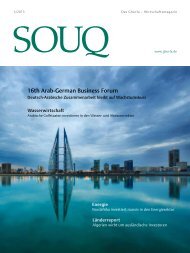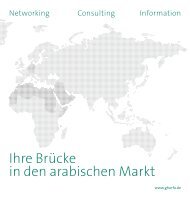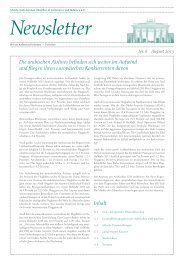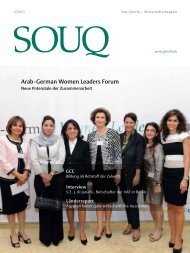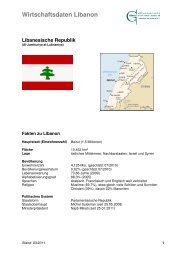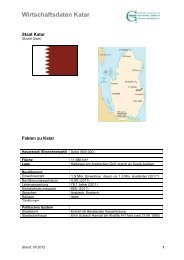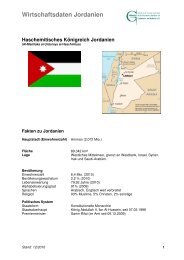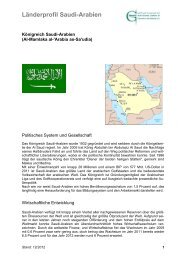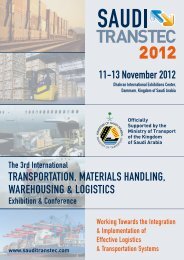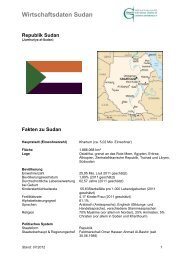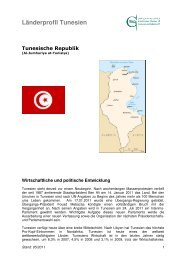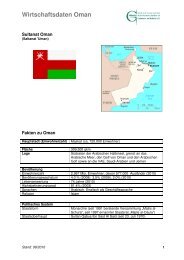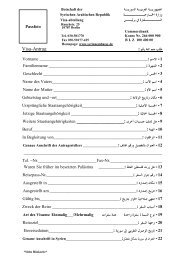Saudi-Arabien Wirtschaftshandbuch Saudi Arabia Business ... - Ghorfa
Saudi-Arabien Wirtschaftshandbuch Saudi Arabia Business ... - Ghorfa
Saudi-Arabien Wirtschaftshandbuch Saudi Arabia Business ... - Ghorfa
Sie wollen auch ein ePaper? Erhöhen Sie die Reichweite Ihrer Titel.
YUMPU macht aus Druck-PDFs automatisch weboptimierte ePaper, die Google liebt.
The IT-sector and the most important infrastructure sectors<br />
are also undergoing change. In recent years, the <strong>Saudi</strong><br />
telecommunications sector has been restructured. The<br />
state monopoly was turned into a telecommunications<br />
company subject to economic criteria (<strong>Saudi</strong> Telecommunication<br />
Company – STC) and around 30% of its capital<br />
stock was sold on the stock exchange. Furthermore, the<br />
telecommunications sector was opened up to allow free<br />
competition under the supervision of the telecommunications<br />
authority.<br />
A similar program is currently being pursued in the energy<br />
sector. Four regional electricity companies (<strong>Saudi</strong><br />
Electricity Companies – SCECO) and six smaller electricity<br />
producers were merged into one company (<strong>Saudi</strong><br />
Electricity Company – SEC) that will be privatised in the<br />
near future. It is estimated that <strong>Saudi</strong> <strong>Arabia</strong> will need<br />
between 1,000 to 2,000 MW electro-energy every year<br />
by the year 2015; this in turn will necessitate investments<br />
of around 10 billion US$.<br />
Other areas in which privatization is due to take place<br />
include air traffic, rail, ports, postal service, mining, water<br />
supply and disposal, desalination of seawater and the<br />
education and health sectors.<br />
Without a doubt, the clearest indication that the <strong>Saudi</strong><br />
economy is opening up and becoming more liberal is the<br />
Foreign Investment Act that allows foreign investors to<br />
own plants and the associated real estate to 100%. The<br />
law not only guarantees that domestic and foreign investors<br />
are treated the same, it also reduces the profit tax<br />
from 45% to 20% and allows the free return of capital,<br />
profits and dividends to the home country. Also, a real<br />
estate law that was passed somewhat later allows foreign<br />
investors to purchase residential real estate. The foreign<br />
investors are subject to all bilateral investment protection<br />
and promotion agreements signed by the <strong>Saudi</strong> state.<br />
Foreign employees working for an approved project are<br />
granted concessions when obtaining the entrance and exit<br />
visas, and residential and work permits.<br />
On 11th November 2005, the General Council of the<br />
WTO approved the entry of <strong>Saudi</strong> <strong>Arabia</strong> to the World<br />
Trade Organisation. <strong>Saudi</strong> <strong>Arabia</strong> is the 149th state to<br />
achieve full membership. All GCC states are now members<br />
of the WTO. In light of the previously achieved economic<br />
reforms, acceptance into the WTO is particularly<br />
significant as it shows that <strong>Saudi</strong> <strong>Arabia</strong> has agreed to<br />
further liberalise its own trading regime and to further<br />
promote the integration of the country into the world<br />
economy by improving and adapting its trade and invest-<br />
WirTSchAfTliche unD POliTiSche eckDATen – – ImPortAnt economIc And PolItIcAl dAtA<br />
ment regulations to the WTO standards. This means that<br />
the country assumes responsibility for the further liberalisation<br />
of the world trade in compliance with its active role<br />
in the development and stabilisation of the world economy<br />
by means of its membership in economic and regional<br />
organisation such as the World Bank, the International<br />
Monetary Fund, the OPEC and the “Group of 20”.<br />
Entry into the WTO will lead to further reforms in the<br />
Kingdom. The negative list of business activities to which<br />
foreign investors are excluded will be further reduced.<br />
This includes continued opening of the insurance market<br />
and banking sector, the disbandment of monopolies (e.g.<br />
in the telecommunications sector), the lifting of export<br />
and import restrictions and the further phase-out of subsidies<br />
for agricultural production. <strong>Saudi</strong> <strong>Arabia</strong> will join<br />
important international initiatives such as the agreement<br />
relating to information technology or the harmonisation<br />
of chemical products. The plan is to slash all duties on<br />
computers, semi-conductors and other IT products by<br />
2008. <strong>Saudi</strong> <strong>Arabia</strong> has also committed to doing away<br />
with duties on pharmaceuticals. Any goods covered by<br />
the WTO agreement relating to the civil aircraft trade<br />
will also be relieved of custom duties. In general, the binding<br />
reduction of the custom duties and the restrictions on<br />
import quantities planned for the next few years will also<br />
create more favourable underlying conditions for German<br />
industrial exports to <strong>Saudi</strong> <strong>Arabia</strong>.<br />
The process of opening the market for foreign banks will<br />
be continued. The entry into the WTO means that foreign<br />
banks can now open offices in <strong>Saudi</strong> <strong>Arabia</strong>. The upper<br />
capital limit for foreigners in joint-venture banks will be<br />
raised from 40% to 60%. All foreign companies in the financial<br />
sector have the guarantee that they will receive<br />
the same treatment as national companies. Even foreign<br />
insurance companies will be able to open branch offices in<br />
<strong>Saudi</strong> <strong>Arabia</strong> in the future. Here again, the upper limit for<br />
capital for foreign interests is now 60%.<br />
In the wholesale or retail trade sector, the former national<br />
protection privilege has been lifted. This means that companies<br />
that have a foreign capital interest of 51% will be<br />
approved in the wholesale sector. From the end of 2008<br />
onwards, this kind of joint-venture trading enterprise may<br />
have a foreign capital interest of 75%. Whilst this applies<br />
to the sales of vehicles, car workshop operations do not<br />
fall under this ruling.<br />
Its acceptance into the World Trade Organisation further<br />
consolidates <strong>Saudi</strong> <strong>Arabia</strong>’s position as a leading market<br />
in the Middle East.<br />
23



